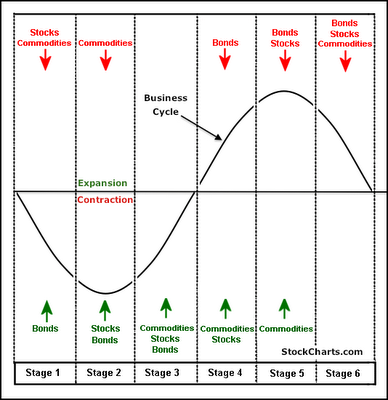In my
last post we learned that inflation is caused by the government's central bank putting more money into circulation than the economy can handle. This dilutes the value of each dollar, causing prices to rise.
1
In a perfect world the central bank (the Fed) would maintain precisely the amount of money in circulation to cause neither inflation nor deflation.
2 However, it is difficult for the Fed to be so precise with the money supply because exactly what the money supply is supposed to correspond to in the economy is not universally agreed upon; and even if it were agreed upon it still might not be possible to know the level of that thing or things in real time. Managing the money supply is a lot like piloting a super tanker. You have to make course changes long before you see the results of them, and then you have to continue to make adjustments based on lagging and possibly misleading feedback.

The Fed, however, always seems to err on the side of inflation. We have almost never had a spat of annual net deflation unless there was some unforeseen economic crisis that caused it. Besides a 2009 rate of -0.34 caused by the credit crisis, the last time we had annual net deflation was in 1955, and then the amount was only -0.28%. While in 1979 through 1981 we experienced inflation rates of 11.22%, 13.58% and 10.35%. So the government is clearly more than willing to tolerate some inflation, usually about 2-4% per year but often more, rather than risk any deflation at all. Why is this?
The official answer you will hear is that they regard deflation as the worst thing an economy could experience. Their fear, which goes back to the Great Depression (the last time we experienced significant deflation) is that falling prices will discourage buying because consumers will hold out for even lower prices, which will cause prices to drop more, causing lower profits, layoffs, less spending, and on and on, in an unstoppable "deflationary spiral."
However, falling prices in electronics over the years haven’t discouraged people from buying HDTVs, computers and smartphones. People buy things when they become affordable to them. Also, true spiraling deflation is only caused by an economic upheaval, like that which caused the Great Depression, not by prices falling -2% a year because the Fed did not print enough money.
So the fear of deflation is an overblown and somewhat disingenuous excuse to always err on the inflation side. The real reasons the government prefers inflation are based on less than stellar motives.
The first reason the government likes inflation is that, all else aside, it gives the impression of growth when there is none. This is because wages increase with inflation as well. Most people are familiar with “cost of living” raises which are supposed to help earners keep pace with inflation. Even though inflation-caused cost of living raises and deflation-caused cost of living reductions would effectively produce the same result, the fact is cost of living raises are much more politically palatable. This is true even though, as we shall see, inflation punishes saving and deflation rewards saving. Politicians want people to think that the economy is growing, so they point to the growth in Gross Domestic Product and leave out the fact that some, most, or all of it was simply inflation.
The second reason the government prefers inflation is that it benefits debtors, and the United States is in debt. Inflation over time lowers the value of debt. If you borrowed a dollar last year and this year a dollar is only worth 97 cents (3% inflation), you’ve saved three cents. In ten years it will only be worth 74 cents, so you would save 26% on your debt simply by the effect of inflation!
Deflation on the other hand causes debt to increase over time. With 3% deflation over ten years, one dollar of debt would become $1.35 of debt, and this in not even counting the interest on the loan.
By the same token, inflation punishes savers. At 3% inflation, a dollar saved would be worth only 74 cents in ten years. Today’s passbook savings accounts pay less than 3%. So even while paying interest such a savings account would lose value over time.
Since inflation punishes savers and rewards borrowers, it discourages savings and encourages borrowing. This suits the government just fine because such a situation encourages borrowing and spending instead of saving and investing. Why in the world would the government want to do this?! The answer is because borrowing and spending stimulates the economy in the short-term, while hurting it in the long term, and saving and investing do the opposite. And since politicians are only interested in the short-term, they prefer borrowing and spending, i.e. inflation.
The third reason government likes inflation is because it is effectively a tax. It is a way an in-debt government can reduce its debt by reducing the wealth of citizens. The last time I checked, that's a tax. It is also a flat tax and a regressive tax--which is ironic considering the multitude of liberal Democrats who support the Keynesian economics that produce inflation. It hits the poor and those on fixed incomes the hardest.
You may have heard of "vice taxes." Well, inflation is a
virtue tax. It punishes the thrifty and rewards the spend-thrifts. This matters little to an in-debt government, because as it gets more drunk on debt, the more attractive inflation becomes, and the more undesirable deflation becomes.
Notes:
1. Nobel prize-winning economist Milton Freidman famously said, “Inflation is always and everywhere a monetary concern." He meant that true inflation is caused by increasing the money supply, not by price shocks.
2. This is, supposedly, the advantage of keeping a currency on the gold standard, because tacking a currency to gold prevents the willy-nilly printing of money for any reason. However, the gold standard is not a perfect solution.














